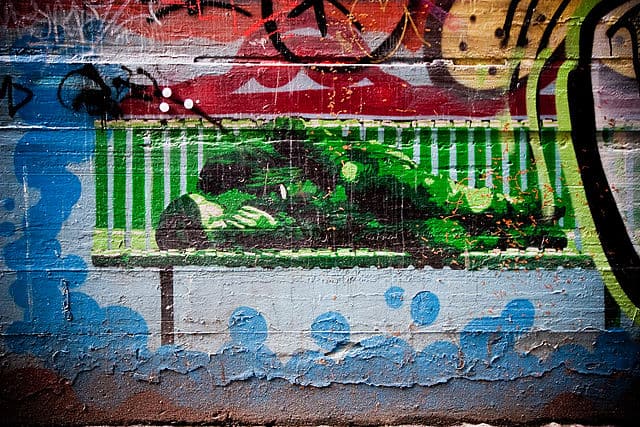It’s estimated that more than 122,000 people are homeless in this country. Many of them are Australians failed by society, slipping through the cracks of social, unemployment and mental health support structures. They may be huddled under blankets on the street, or sleeping in boarding houses, with people they know or in places that will have them for a while before they have to move on.
Others among the homeless are asylum seekers who came to Australia in the hope of finding safety and a new home. After immigration detention, they are given no government supported accommodation while waiting for their claims to be determined, which can take years. These people have been made homeless twice over – forced to leave their home in their country of origin because it was not safe to stay or their house ceased to exist. Then, after reaching Australia and applying for protection, they are made homeless again – this time not by accident: they are shut out by a hostile and deeply-flawed asylum system.
‘Everyone needs a home’
Mazzar* is one of thousands of asylum seekers waiting for more than a decade for their cases to be resolved. For years, he has been navigating the process of applications and appeals and – being one of the ‘lucky’ ones with a visa giving him permission to access the job market – working hard to keep a roof over his head. Mazzar can never return to live in Pakistan. He still has no idea if or when Australia will accept him, but he is desperate to become a citizen. “Everyone needs a home. Otherwise, what are we doing?,” he said.
There are so many others who have no option but to seek help from charities to escape destitution. Unlike Mazzar, many are denied the right to work, either as a condition of their bridging visa, or because they have no visa at all. Ravi* from Sri Lanka, who has been without a visa for the past five years, has had to get whatever cash-in-hand jobs he could find. Now, even this insecure work has dried up, and he’s fallen months behind on the rent and faces eviction.
The risk and the reality of homelessness for thousands of asylum seekers who have been trapped in limbo in Australia has many damaging flow-on effects, including severe mental health problems. Twelve years after Khati* fled Iran, her case is still under review. Earlier this year she suffered domestic violence, was unable to work and eventually ran out of money altogether.
“I went to see BASP with my son because I didn’t have any place to live. I couldn’t pay the rent. They gave me a house. I was alone (and I had) lost my job,” said Khati. “Now I am up and down. I don’t know what I should do. I am using the tablets for depression, and InTouch (a family violence provider for migrant and refugee women) organized a counsellor for me. I don’t know about the future.”
Australia’s hostile environment
It is hard to see how homelessness among asylum seekers is not created by design. While the policy has not been named as such here, the ‘hostile environment’ to which asylum seekers are subjected in Australia is fit to rival the UK original announced some 13 years ago. As Sophie Singh, from the Canberra Refugee Action Campaign, recently wrote:
“Make no mistake. Australia’s refugee and asylum policies inflict deliberate cruelty, intended to break a person such that they would ‘choose’ to return to their homeland, to the dangers that they have fled.”
According to the Refugee Council of Australia, an estimated 5,000 people seeking asylum across the country are living in crisis and destitution as a result of these cruel policies. Yet in discussions about the homelessness issue and how to solve it, asylum seekers and those without visas are often left out of the picture and excluded from housing and homelessness strategies.
As a signatory to international treaties, Australia has recognised that the right to housing is a fundamental human right. There is some chance that Victoria and the ACT will soon pass amendments to their human rights laws to include the right to housing. This may mean little in practical terms for the people seeking help from charities like BASP, but it’s surely important that our governments and public authorities acknowledge and respect the right to housing for everyone who lives in our society, no matter where they have come from.
Fact check:
- Asylum seekers in Australia are ineligible for mainstream housing services
- Most asylum seekers have to rely on charities – which receive little or no government funding – to provide temporary or crisis accommodation
- Government financial support for asylum seekers (Status Resolution Support Services – SRSS) is available only to a very small number who meet strict criteria
- Many asylum seekers are on temporary bridging visas which do not permit them to work or seek employment. This leads to destitution and homelessness, mental and physical health problems, and family breakdown
- There has been a sharp increase in asylum seekers sleeping rough or living in unsafe conditions
Homelessness Week 2025 is from 4-10 August.
*Names have been changed

